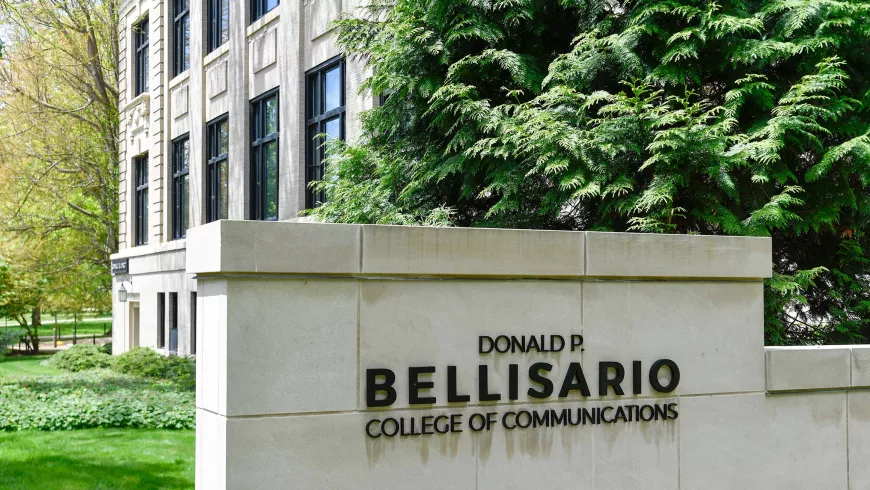100% Online
Complete your Penn State course work at your own pace and 100% online.
Application deadline
Credits and costs
No GRE/GMAT
or undergraduate communications degree required
Gain Skills to Communicate Effectively
Apply theory to solve industry problems and design effective communications campaigns.
Use established methods and practices to conduct effective research.
Collect and analyze digital media audience data.
Create, execute, and evaluate communication strategies and digital communications.
Strategic Communication Courses
Strategic Communication Courses
This 30-credit graduate program is designed for working professionals seeking advanced education in strategic communications to enhance their careers, support organizational goals and objectives, and aid in developing and implementing strategic communications plans and campaigns for organizations and clients.
Electives in this online master’s degree program give you the opportunity to dive deep into leadership, digital analytics, social media, communications law, and more, so you can specialize your skill set for your career path.
Required Courses (18 credits)
- 3credits
Provides students with an understanding of the methods and practices used to conduct effective research in examining practical and theoretical questions in strategic communications.
- 3credits
A comprehensive overview of professional strategic communications by examining key theoretical and conceptual fundamentals of persuasive communication, attitude formation and change, and mass communication, while examining applied implications that affect the strategic communications industry.
- 3credits
Provides students with an overview of the merging of the advertising, public relations, and corporate communications industries.
- 3credits
An overview of the methods for collecting, analyzing, and utilizing audience data for digital media.
- Prerequisite
COMM 530, COMM 830
- 3credits
Investigates transparency, digital ethics, diversity, and mass communication ethics as they apply to the development and application of communications strategy and content.
- Prerequisite
COMM 830
- 3credits
This capstone course requires students to apply the knowledge they have acquired in all the other foundation courses to develop a strategic communications campaign on behalf of a professional client.
- Prerequisite
COMM 530, COMM 531, COMM 830, COMM 831, COMM 833
Additional Courses (select 6 credits)
- 3credits
Focuses on two areas: an in-depth understanding of the social media impact on strategic communications and how to make best use of social media tools.
- Prerequisite
COMM 830
- 3credits
Explore the economic, political, and social impact of culture and race in our society, socioeconomic differences, trends within various multicultural communities and groups, and how traditional and new media are reaching these communities.
- Prerequisite
COMM 830
- 3credits
This course examines how the First Amendment applies to strategic communications, the basic tenets of advertising regulation, privacy issues including the collection and use of personal and geolocation information, intellectual property issues including the use of trademarks and copyrights, and the role of self-regulation in a global communications environment.
- Prerequisite
COMM 830
- 3credits
Prepares students to demonstrate their competency and ability to navigate the digital media ecosystem and to develop, implement, administer, and evaluate digital marketing campaigns.
- Prerequisite
COMM 530, COMM 830, COMM 831
Electives (select 6 credits)
Students must take at least six additional elective credits from any Penn State World Campus course(s) — this includes 400-level courses and all elective courses listed above.
Course Availability
If you're ready to see when your courses will be offered, visit our public LionPATH course search (opens in new window) to start planning ahead.
Start or Advance Your Career

Start or Advance Your Career
The skills you possess as a graduate of this master’s in communication program can make you a valuable asset to media outlets, businesses, government, and education and nonprofit organizations. You'll also have the support of Penn State career resources to pursue opportunities in a variety of fields, depending on your goals.
Job Titles Related to This Degree
The following roles are often held by people with this type of degree:
- Communications Director
- Content Manager
- Promotions Director
- Public Affairs Director
- Public Relations Director (PR Director)
Employment Outlook for Occupational Fields Related to This Degree
Estimates of employment growth and total employment are provided by the U.S. Bureau of Labor Statistics and are subject to change. While these occupations are often pursued by graduates with this degree, individual outcomes may vary depending on a variety of factors. Penn State World Campus cannot guarantee employment in a given occupation.
Public Relations Managers
Advertising and Promotions Managers
Career Services to Set You Up for Success

From the day you're accepted as a student, you can access resources and tools provided by Penn State World Campus Career Services to further your career. These resources are beneficial whether you're searching for a job or advancing in an established career.
- Opportunities to connect with employers
- Career counselor/coach support
- Occupation and salary information
- Internships
- Graduate school resources
Penn State World Campus offers career counseling, events, and opportunities for students and alumni. The academic home of this program, the Donald P. Bellisario College of Communications, provides students with career and internship guidance through the College’s Office of Internships and Career Services, as well as the opportunity to network with college alumni and view job postings. Alumni have the ability to join the Ad/PR Network through the Bellisario Office of Alumni Relations and have the opportunity to access resources within Penn State’s Alumni Association Career Services.
Ready to Learn More?
Get the resources you need to make informed decisions about your education. Request information on this program and other programs of interest by completing this form.
Ready to take the next step toward your Penn State master's degree?
Costs and Financial Aid
Costs and Financial Aid
Learn about this program's tuition, fees, scholarship opportunities, grants, payment options, and military benefits.
Costs and Financial Aid
Graduate Tuition
Graduate tuition is calculated based on the number of credits for which you register. Tuition is due shortly after each semester begins and rates are assessed every semester of enrollment.
2025–26 Academic Year Rates
| How many credits do you plan to take per semester? | Cost |
|---|---|
| 11 or fewer | $1,037 per credit |
| 12 or more | $12,448 per semester |
2026–27 Academic Year Rates
| How many credits do you plan to take per semester? | Cost |
|---|---|
| 11 or fewer | $1,048 per credit |
| 12 or more | $12,572 per semester |
Financial Aid and Military Benefits
Some students may qualify for financial aid. Take the time to research financial aid, scholarships, and payment options as you prepare to apply. Federal financial aid may only be used to pay for credits used to satisfy program requirements.
Military service members, veterans, and their spouses or dependents should explore these potential military education benefits and financial aid opportunities, as well.
Additional Cost of Attendance Details
To view the detailed list of cost of attendance elements:
- visit the Tuition Information site
- click the plus sign to expand the table
- select a semester from the World Campus row
Technical Requirements
Review the technical requirements for this program.
Who Should Apply?
Who Should Apply?
This online program is designed for those seeking advanced education in strategic communications to enhance their careers, support organizational goals and objectives, and aid in developing and implementing strategic communications plans and campaigns for organizations and clients.
Should Students Currently Seeking a Bachelor’s Degree Apply?
The MPS program is designed for graduate students who have professional experience in the field of strategic communications and would like to expand their knowledge and expertise in theory-driven message design, digital analytics, client communication, leadership, and ethics. The concepts emphasized throughout the program necessitate a foundational knowledge of strategic communications and professional experience in the industry.
What is an MPS Degree?
What is an MPS Degree?
The MPS degree is a professionally focused master’s degree. Our MPS program is as rigorous as a traditional master’s program, but the courses focus more deeply on the knowledge and skills a strategic communications professional needs to be successful in the workplace.
While many traditional master’s programs prepare students for careers in research or academia, our program is designed for communications professionals who want to remain in the industry but need more knowledge or technical expertise to advance in their careers.
Set Your Own Pace

Set Your Own Pace
Whether you are looking to finish your program as quickly as possible or balance your studies with your busy life, Penn State World Campus can help you achieve your education goals. Many students take one or two courses per semester.
Our online courses typically follow a 12- to 15-week semester cycle, and there are three semesters per year (spring, summer, and fall). If you plan to take a heavy course load, you should expect your course work to be your primary focus and discuss your schedule with your academic adviser.
To Finish Your Degree in One to Two Years
- Take 3–4 courses each semester
To Finish Your Degree in Two to Three Years
- Take 2–3 courses each semester
To Finish Your Degree in Three to Four Years
- Take 1 course each semester
Timelines may vary based on course availability.
Convenient Online Format
This program's convenient online format gives you the flexibility you need to study around your busy schedule. You can skip the lengthy commute without sacrificing the quality of your education and prepare yourself for more rewarding career opportunities without leaving your home.
A Trusted Leader in Online Education

Penn State has a history of more than 100 years of distance education, and World Campus has been a leader in online learning for more than two decades. Our online learning environment offers the same quality education that our students experience on campus.
How to Apply to Penn State

How to Apply to Penn State
Apply by November 1 to start January 12
Application Instructions
Deadlines and Important Dates
Complete your application and submit all required materials by the appropriate deadline. Your deadline will depend on the semester you plan to start your courses.
Spring Deadline
Apply by November 1 to start January 12Summer Deadline
Apply by April 1, 2026, to start May 18, 2026Fall Deadline
Apply by July 15, 2026, to start August 24, 2026
Steps to Apply
For admission to the J. Jeffrey and Ann Marie Fox Graduate School, an applicant must hold either (1) a baccalaureate degree from a regionally accredited U.S. institution or (2) a tertiary (postsecondary) degree that is deemed comparable to a four-year bachelor's degree from a regionally accredited U.S. institution. This degree must be from an officially recognized degree-granting institution in the country in which it operates.
GPA – Though our program does not require a minimum grade-point average for admission, a junior/senior GPA of 3.00 (on a 4.00 scale) is recommended.
You will need to upload the following items as part of your application:
Official transcripts from each institution attended, regardless of the number of credits or semesters completed. Transcripts not in English must be accompanied by a certified translation. If you are a Penn State alum, you do not need to request transcripts for credits earned at Penn State but must list Penn State as part of your academic history.
Test Scores — Graduate school entrance exams (e.g., GRE, GMAT) are not required for entrance into the degree program and are not to be submitted as part of the application process.
English Proficiency — The language of instruction at Penn State is English. With some exceptions, international applicants must take and submit scores for the Test of English as a Foreign Language (TOEFL) or International English Language Testing System (IELTS). Minimum test scores and exceptions are found in the English Proficiency section on the Fox Graduate School's "Requirements for Graduate Admission" page. Visit the TOEFL website for testing information. Penn State's institutional code is 2660.
References (3) — You will need to initiate the process through the online application by entering names, email addresses, and mailing addresses of three references. Upon submission of your application, an email will be sent to each reference requesting they complete a brief online recommendation regarding your commitment for success in an online program. Please inform all recommenders they must submit the form in order for your application to be complete.
Program-Specific Questions/Materials
Résumé — Upload your résumé to the online application.
Statement of Purpose — Two to three pages explaining your background in strategic communications, your goals related to the strategic communications industry, and how the MPS degree will help you to meet your goals.
Writing Sample — An academic or professional work demonstrating your analytical and writing abilities. Applicants’ writing samples should exemplify their best academic and/or professional writing. Academic writing samples should include citations and references and demonstrate applicants’ analytical abilities. Professional writing samples should demonstrate applicants’ writing skills in areas such as public relations, advertising, social media, and strategic communications. While there is no length requirement, writing samples should be complete enough to fully demonstrate strong writing and analytical skills. Applicants can submit a combination of academic and professional writing samples in one PDF document.
To begin the online application, you will need a Penn State account.
Create a New Penn State Account
If you have any problems during this process, contact an admissions counselor at [email protected].
Please note: Former Penn State students may not need to complete the admissions application or create a new Penn State account. Please visit our Returning Students page for instructions.
You can begin your online application at any time. Your progress within the online application system will be saved as you go, allowing you to return at any point as you gather additional information and required materials.
- Choose Enrollment Type: "Degree Admission"
- Choose "WORLD CAMPUS" as the campus
Checking Your Status
You can check the status of your application by using the same login information established for the online application form.5. Complete the application.
Admissions Help
If you have questions about the admissions process, contact an admissions counselor at [email protected].
Contact Us

Contact Us
Have questions or want more information? We're happy to talk.
To learn more about the Master of Professional Studies in Strategic Communications, please contact:
World Campus Admissions Counselors
Phone: 814-863-5386
[email protected]
Holly Overton, Ph.D.
Associate Professor, Lead Faculty
Donald P. Bellisario College of Communications
The Pennsylvania State University
211 Carnegie Building
University Park, PA 16802
[email protected]
Learn from the Best
Learn from the Best
In this program, you will study with highly regarded faculty from the largest accredited school in its field, the Donald P. Bellisario College of Communications. As a graduate, you become part of a worldwide network of more than 775,000 alumni, increasing your networking potential.
Faculty
Lee Ahern
- DegreePh.D., Mass Communications, Penn State
- DegreeM.A., Journalism, University of Wisconsin-Madison
- DegreeB.A., Journalism, University of Wisconsin-Madison
- DegreeB.S., Economics, University of Wisconsin-Madison
Dr. Lee Ahern, associate professor of advertising and public relations, has nearly 20 years of experience as a marketing manager and a financial writer in New York and in various communications capacities on Wall Street. Ahern directs the science communication program; he also developed and coordinates the digital media trends and analytics minor. He serves as a senior research fellow at the Arthur W. Page Center for Integrity in Public Communication. Ahern co-edited the book Talking Green: Exploring Contemporary Issues in Environmental Communications. He teaches digital metrics, advertising, and research methods.
Michelle Baker
- DegreePh.D., Mass Communications, Penn State
- DegreeM.S., Communications Studies, Shippensburg University
- DegreeB.A., Communications/Journalism, Shippensburg University
Dr. Michelle Baker is the director of eLearning Initiatives and an assistant teaching professor in the Department of Advertising and Public Relations at the Donald P. Bellisario College of Communications. She oversees the college's portfolio of online degree programs, which includes a B.A. in Digital Journalism and Media, an MPS and B.A. in Strategic Communications, and a media studies minor. Dr. Baker has been teaching both in-residence and online classes for Penn State since 2009, and she has more than 20 years of teaching and administrative experience in higher education. She has experience working as a journalist and freelance writer, and she served as the assistant editor for Bucknell University’s alumni magazine. She teaches COMM 160.
Colleen Connolly-Ahern
- DegreePh.D., Communications, University of Florida
- DegreeM.A., Mass Communications, University of Florida
- DegreeB.A., History, Georgetown University
Dr. Colleen Connolly-Ahern, associate professor of advertising and public relations, worked as the promotion manager for USA Today and as the managing editor for the magazine Marine Log before starting her own marketing communications firm, Abbey Lane Marketing, which served clients in the banking, publishing, and education business areas. A scholar of international communications, Connolly-Ahern is an expert in the area of applied communications research, with a focus on refugees and communication. She served as the co-editor of American Behavioral Scientist Special Issue: Refugee Communications in the Digital Age. Connolly-Ahern also has expertise in science communication and conducts grant-funded research in the area of nutrition. She teaches undergraduate- and graduate-level research methods courses as well as international and intercultural strategic communications.
Frank Dardis
- DegreePh.D., Mass Communication, University of South Carolina
- DegreeM.A., Mass Communication, University of Florida
- DegreeB.S., Telecommunication, University of Florida
Dr. Frank Dardis, associate professor of advertising and public relations, worked in advertising and marketing communications for several large corporations, including an Anheuser-Busch subsidiary, a golf course/community developer, and a professional baseball team. Dardis’ research explores the psychological and persuasive effects that informational messages have on individuals, primarily within the sociopolitical and marketing/consumer-related contexts. A faculty affiliate of Penn State’s Media Effects Research Laboratory, Dardis teaches courses in advertising, research methods, and strategic communications.
Matthew Jackson
- DegreePh.D., Mass Communication, Indiana University
- DegreeM.A., Mass Communication, University of Florida
- DegreeB.S., Telecommunication, University of Florida
Dr. Matthew Jackson, associate professor of telecommunications, has worked in both commercial and public radio, where he earned regional awards from the Associated Press for his radio features. His articles on internet copyright have been included as recommended reading at Harvard Law School and Catholic University, and his expert commentary has appeared in such media outlets as The Wall Street Journal, the Los Angeles Times, and The Guardian. He researches the impact of copyright on free speech and teaches courses in telecommunications policy, media programming, and strategic communications law.
Shannon Kennan
- DegreePh.D., Mass Communications, Penn State
- DegreeM.Ed., Counseling Psychology, College Student Personnel Administration, James Madison University
- DegreeB.A., Early Childhood Education, University of Richmond
Dr. Shannon Kennan is a teaching professor and serves as the first-year seminar coordinator and the curriculum coordinator for journalism. Her teaching expertise focuses on applying ethics and DEIB to mass comm industries. Shannon's educational experiences provide a mix of skills that allow her to bring a student-centered focus to her teaching. She has worked in higher education in a variety of administrative and teaching roles since 1995 and joined the Donald P. Bellisario College of Communications in 2011 as the director of eLearning Initiatives to build the existing portfolio of online and hybrid courses and programs.
Renea Nichols
- DegreeM.S.T.R, Arizona State University
- DegreeB.A., Journalism, Central Michigan University
Professor Renea Nichols is an associate teaching professor in the Department of Advertising and Public Relations at the Donald P. Bellisario College of Communications. She has held public relations positions with the City of Phoenix, U-Haul International, Arizona Special Olympics, and the ASU Alumni Association. Professor Nichols has also served as a public relations consultant to organizations such as the National Kidney Foundation, the Maricopa Association of Governments, and many top public relations agencies in Arizona. She has worked as a reporter for daily newspapers in Michigan, Maryland, and Ohio. Professor Nichols is the author of four books on interracial dating and multi-racial populations and has appeared in national news media to discuss these topics. She teaches COMM 230W.
Holly Overton
- DegreePh.D., Mass Communications, Penn State
- DegreeM.S., Communication Studies, Shippensburg University
- DegreeB.A., Communication/Journalism, Shippensburg University
Dr. Holly Overton, associate professor of advertising and public relations, has more than 15 years of experience in higher education and worked for five years in public relations and marketing. She is the research director for the Arthur W. Page Center for Integrity in Public Communication. Overton conducts public relations research in the areas of ethics, corporate social responsibility communication, and corporate social advocacy. She is a member of Page, a prestigious association of leaders and experts in corporate communications. She teaches public relations, research methods, and ethics.
Rachelle Pavelko
- DegreePh.D., Mass Communication, Indiana University
- DegreeM.A., Journalism, University of Memphis
- DegreeB.A., Journalism, Ohio Northern University
Dr. Rachelle Pavelko, assistant teaching professor, joined the Donald P. Bellisario College of Communications at Penn State in 2024. She was previously an associate professor of public relations at Bradley University. Pavelko conducts research in the areas of health communication and media effects, with a focus on how messages within pop culture inform perceptions of mental health. She teaches courses in social media, strategic communication theory, research methods, and public relations campaigns.
Fuyuan Shen
- DegreePh.D., Mass Communication, University of North Carolina at Chapel Hill
- DegreeM.A., Journalism, University of Montana
- DegreeB.A., English, East China Normal University
Dr. Fuyuan Shen, professor of advertising and public relations, is head of the department of advertising and public relations in the Donald P. Bellisario College of Communications. An affiliate faculty of Penn State’s Media Effects Research Lab, Shen explores the effects of messages on individuals’ information processing and attitudes related to health communication, political communication, and risk perceptions. Shen has taught as a visiting professor at Hong Kong Baptist University and the University of Hawaii at Manoa. He teaches courses in advertising and strategic communications.
News



